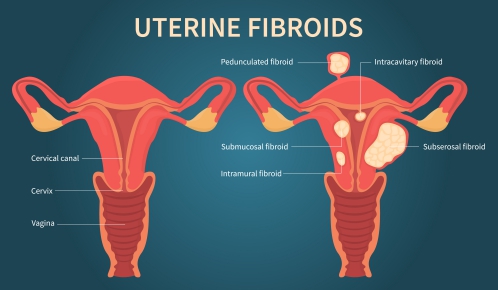Uterine fibroid, Fibroids, Leiomyoma, Myoma, Uterus, Heavy menstrual bleeding, Myomectomy
Description : Uterine fibroid, also known as leiomyoma or myoma, is the most common tumour that can develop in
Article Details :
What are uterine fibroids?
Uterine fibroid, also known as leiomyoma or myoma, is the most common tumour that can develop in the pelvis of a woman. It is a noncancerous tumour that arises from the muscles cells present in the uterus. It presents as growths or masses that bulges either inside or outside of the uterus. Fibroids do not usually undergo malignant transformation, meaning that they are not likely to become cancerous. However, it is important to distinguish between a cancerous and noncancerous mass once detected in the uterus.
Fibroid is a very common disorder among women. Around 80% of women will at some point in their life end up having fibroids. However, not everyone will have bothersome symptoms. Fibroids can be related to several problems such as heavy periods, abdominal pain and fertility problems. The prevalence of uterine fibroids increases with increasing age. Most fibroids will shrink following menopause.
There are several treatment options available to treat the problems related to fibroids as well as the fibroids themselves if too bothersome.
What are the causes of uterine fibroids?
The exact cause of uterine fibroids is unknown. It has been observed that fibroids may be responding to levels of hormones present in a woman, including estrogen and progesterone. In some cases, genetics may be contributing to the development of fibroids. Some inherited genes may be the cause. Lifestyle and reproductive factors may also play a big role in the development of uterine fibroids. The course of the condition will vary among women. In some women, the fibroids may increase in size while in others, they may shrink.
What are the risk factors for uterine fibroids?
The following factors may have an influence on the development of fibroids:
· Race: Black women are more prone to have uterine fibroids compared to white women. Black women are also more likely to have fibroids at a younger age compared to white women.
· Number of pregnancies: If you have had at least one previous pregnancy which lasted beyond 20 weeks of gestation, you have a lower risk of having fibroids. The higher the number of pregnancies, the lower the risk.
· Early menarche: Having your first menses at an age younger than 10 years can increase your risk of having fibroids later in life.
· Hormonal contraception: Long-acting progestin-only contraceptives has been shown to provide protection against having fibroids.
· Diet: What you eat can have an impact on the development of fibroids. Increased consumption of red meats or processed foods can increase your risk of having fibroids. Consumption of green vegetables and fruits can have protective effect against fibroids.
· Alcohol consumption: This increases the risk of having uterine fibroids.
· Smoking: Ironically, smoking has been found to decrease the risk of having uterine fibroids.
· Genetics: If you have close family members with the same condition, you are at increased risk of developing it later in life.
What are the symptoms of uterine fibroids?
Uterine fibroids can manifest with the following symptoms:
· Changes in menstrual bleeding: Uterine fibroids can lead to heavy and/or prolonged menses. This is because the fibroid leads to an increase in surface area of the inner lining of your uterus. The degree by which it is increased depends on the location and size of the fibroid. This can further lead to anemia and social embarrassment.
· Pressure or pain in the pelvis: This is closely related to big fibroids as they tend to compress on surrounding structures. Back pain can sometimes also be present.
· Problems with the urinary and digestive system: Some people may experience symptoms such as incomplete emptying of the bladder, increased frequency of urination and rarely, complete obstruction to urine outflow. Uterine fibroids can also cause compression on the rectum leading to constipation.
· Painful periods: Many women complain of painful menses when they have fibroids. It may also be associated with the passage of blood clots.
· Painful sexual intercourse: This symptom depends on the location of the fibroid as not all fibroids will cause pain with sexual intercourse.
· Infertility and complications during pregnancy: Women with uterine fibroids may have difficulty to fall pregnant. It is also associated with an increased risk of miscarriage if identified during the first trimester.
How is the diagnosis of uterine fibroids made?
Your doctor will start by asking you a series Read more



